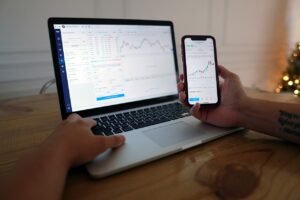Forex trading in South Africa has become increasingly popular among investors looking to capitalize on the volatility and opportunities within the foreign exchange market. The dynamics of forex trading are significantly influenced by the country’s economic policies, including monetary policy decisions, fiscal strategies, and regulations governing financial markets. These policies can have profound effects on the rand’s value, affecting traders’ strategies and outcomes. Understanding the interplay between South African economic policies and forex market dynamics is crucial for traders aiming to navigate this complex landscape successfully.
The Role of the South African Reserve Bank (SARB)
Monetary Policy and Interest Rates
The South African Reserve Bank (SARB) plays a pivotal role in shaping the forex trading environment through its monetary policy decisions. Interest rate adjustments, in particular, are closely watched by forex traders. An increase in interest rates can attract foreign capital, leading to a stronger rand, while rate cuts might have the opposite effect. Forex traders must stay abreast of SARB announcements and policy shifts to anticipate currency movements and adjust their trading strategies accordingly.
Currency Intervention
The SARB occasionally intervenes in the forex market to stabilize the rand or reach other economic objectives. Such interventions can range from direct buying or selling of the rand to verbal interventions where policy statements are used to influence market sentiment. Traders need to be aware of these potential interventions, as they can lead to sudden and significant changes in the rand’s value against other currencies.
Fiscal Policy and Its Implications for Forex Trading
Government Spending and Taxation
South Africa’s fiscal policy, including government spending and taxation decisions, also impacts forex trading dynamics. Expansionary fiscal policies, such as increased government spending or tax cuts, can stimulate economic growth but might lead to inflationary pressures and a weaker rand in the long term. Conversely, contractionary policies can strengthen the currency but may also slow down economic growth. Forex traders should monitor these policy directions to gauge their potential impact on currency strength and market volatility.
Budget Announcements and Economic Reforms
Annual budget announcements and plans for economic reforms are significant events that forex traders in South Africa watch closely. These announcements can lead to immediate reactions in the forex market as traders adjust their positions based on the perceived impact of these policies on the economy and the currency. Economic reforms aimed at enhancing growth, improving fiscal stability, or addressing structural challenges can be particularly influential in shaping market expectations and currency movements.
Analyzing the Impact of External Trade Policies on Forex Dynamics
Trade Balance and Currency Value
South Africa’s trade policies and its balance of trade play a crucial role in the forex market dynamics. A favorable trade balance, where exports exceed imports, can lead to a stronger rand, as foreign buyers convert their currencies into rand to pay for South African goods. Conversely, a trade deficit can weaken the currency. Forex traders must analyze global trade patterns, commodity prices, and bilateral trade agreements, as these factors significantly impact South Africa’s trade balance and, subsequently, forex trading strategies.
International Partnerships and Agreements
The country’s involvement in international economic partnerships and trade agreements can also influence forex trading dynamics. Agreements that open up new markets for South African products or attract foreign investment can strengthen the rand by improving the trade balance and increasing demand for the currency. Traders should keep an eye on negotiations and developments in international trade relations, as these can provide early signals of potential shifts in currency strength.
The Influence of Political Stability and Economic Performance
Political Events and Market Sentiment
Political stability is a critical factor affecting investor confidence and market sentiment in forex trading. Political events, elections, and changes in government policies can lead to fluctuations in the forex market as traders react to potential impacts on economic stability and growth prospects. South African forex traders need to be attuned to the political landscape, understanding how shifts in governance or policy direction could affect the rand’s value.
Economic Indicators and Their Effects on Forex Trading
Economic performance indicators, such as GDP growth rates, inflation, and unemployment figures, provide valuable insights into the health of South Africa’s economy and the potential direction of forex market movements. A strong economic performance can bolster the rand by attracting foreign investment and increasing demand for the currency. Conversely, signs of economic weakness may lead to a sell-off in the rand. Forex traders rely on these indicators to inform their trading decisions, adapting their strategies in response to economic trends.
The Future of Forex Trading in South Africa
Anticipating Market Trends and Technological Advancements
The forex market in South Africa is subject to continuous change, influenced by global economic trends, technological advancements, and shifts in investor behavior. Looking forward, traders should anticipate and adapt to these changes, leveraging new technologies such as artificial intelligence and blockchain to analyze market data more efficiently and execute trades with greater precision. Staying ahead of technological trends can provide traders with a competitive advantage, enabling them to identify and act on trading opportunities more swiftly.
The Role of Education and Continuous Learning
Continuous education and learning are essential for forex traders aiming to succeed in the dynamic and complex market environment of South Africa. Understanding the nuances of economic policies, market analysis, and trading psychology can enhance decision-making and strategic planning. Traders should seek out educational resources, participate in trading forums, and possibly engage in formal training or mentorship programs to deepen their knowledge and stay updated on best practices and market developments.
Conclusion: Navigating Forex Trading with Insight and Adaptability
Forex trading in South Africa presents both opportunities and challenges, heavily influenced by the country’s economic policies, regulatory environment, and global market dynamics. By understanding the impact of these factors on the forex market, traders can navigate the complexities with greater confidence and strategic insight. Embracing technological advancements, adhering to regulatory and ethical standards, and committing to continuous education are key to achieving long-term success in forex trading. As the market evolves, adaptability and informed decision-making will remain critical for traders looking to capitalize on the dynamic world of forex trading in South Africa.



